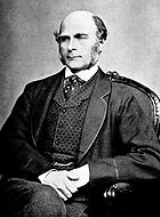
Francis Galton
Sir Francis Galton F.R.S. (16 February, 1822 – 17 January, 1911), was an English Victorian polymath, anthropologist, eugenicist, tropical explorer, geographer, inventor, meteorologist, proto-geneticist, psychometrician, and statistician. He was a half-cousin of Charles Darwin.
Sourced
- One of the effects of civilization is to diminish the rigour of the application of the law of natural selection. It preserves weakly lives that would have perished in barbarous lands.
- "Hereditary Talent and Character" in MacMillan's Magazine Vol. XII (May - October 1865), p. 326.
- There is a steady check in an old civilisation upon the fertility of the abler classes: the improvident and unambitious are those who chiefly keep up the breed. So the race gradually deteriorates, becoming in each successive generation less fit for a high civilisation.
- Hereditary Genius (1869), p. 414
- I have already spoken in Hereditary Genius of the large effects of religious persecution in comparatively recent years, on the natural character of races, and shall not say more about it here; but it must not be omitted from the list of steady influences continuing through ancient historical times down, in some degree, to the present day, in destroying the self-reliant, and therefore the nobler races of men.
- Inquiries Into Human Faculty and Its Development (1883), p. 80
- A really intelligent nation might be held together by far stronger forces than are derived from the purely gregarious instincts. A nation need not be a mob of slaves, clinging to one another through fear, and for the most part incapable of self-government, and begging to be led; but it might consist of vigorous self-reliant men, knit to one another by innumerable ties, into a strong, tense, and elastic organisation.
- Inquiries Into Human Faculty and Its Development (1883), p. 80
